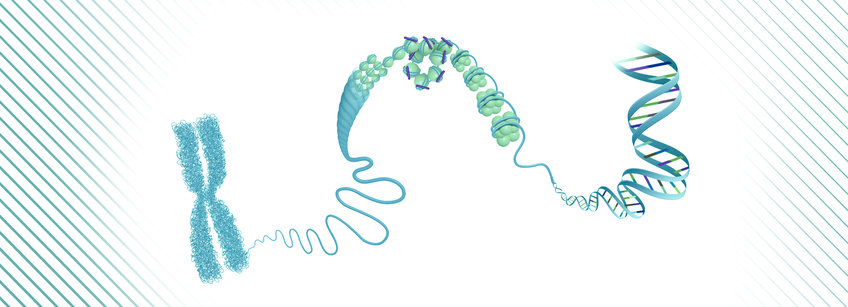
Max Planck Research Group Tessarz
Chromatin and Ageing
To fit into the tiny cell nucleus, the long, chain-like DNA, the carrier of genetic information, is wrapped around histone proteins and compacted. This so-called chromatin structure has a direct influence on the activity of genes and thus on the entire cell. In our research group, we are investigating how chromatin structure and gene activity change during the ageing process.
The Tessarz lab has relocated to the Radboud Institute for Molecular Life Sciences (Nijmegen, Netherlands) at the end of 2023.
Chromatin is the complex of DNA and proteins that can be found in the nucleus of a cell. We are very interested in understanding how the architecture of chromatin can regulate gene expression. In particular, we aim to elucidate how age-related changes in the epigenome influence transcriptional outputs and ultimately, cellular fate decisions. Over the recent years, we became fascinated by the connection of other cellular pathways with epigenetic mechanisms and have expanded our research to address the connection between metabolism and inter-organellar communication on chromatin architecture. To this end we combine mechanistic approaches in S. cerevisiae and established cell culture systems with analysis of primary cells and tissues using biochemistry, cell biology and a variety of state-of-the art deep sequencing technologies.
Selected publications
Hypoxia promotes osteogenesis by facilitating acetyl-CoA-mediated mitochondrial-nuclear communication
Pouikli, A., Maleszewska, M., Parekh, S., Yang, M., Nikopoulou, C., Bonfiglio, J. J., Mylonas, C., Sandoval, T., Schumacher, A. L., Hinze, Y., Matic, I., Frezza, C., Tessarz, P.
(2022) EMBO J, e111239
Aging is associated with increased chromatin accessibility and reduced polymerase pausing in liver
Bozukova, M., Nikopoulou, C., Kleinenkuhnen, N., Grbavac, D., Goetsch, K., Tessarz, P.
(2022) Mol Syst Biol, 18, 9, e11002
Chromatin remodeling due to degradation of citrate carrier impairs osteogenesis of aged mesenchymal stem cells
Pouikli, A., Parekh, S., Maleszewska, M., Nikopoulou, C., Baghdadi, M., Tripodi, I., Folz-Donahue, K., Hinze, Y., Mesaros, A., Hoey, D., Giavalisco, P., Dowell, R., Partridge, L., Tessarz, P.
(2021) Nature Aging, 1, 9, 810-825
Nhp2 is a reader of H2AQ105me and part of a network integrating metabolism with rRNA synthesis
Mawer, J. S. P., Massen, J., Reichert, C., Grabenhorst, N., Mylonas, C., Tessarz, P.
(2021) EMBO Rep, 10, 22, e52435
Glutamine methylation in histone H2A is an RNA-polymerase-I-dedicated modification
Tessarz, P., Santos-Rosa, H., Robson, S. C., Sylvestersen, K. B., Nelson, C. J., Nielsen, M. L., Kouzarides, T.
(2014) Nature, 505, 7484, 564-8
Highlights |
|
|---|---|
| 2022 - 2024 | Marga and Walter Boll Foundation |
| 2021 - 2024 | BMBF Research Consortium IDEpiCo |
| 2019 - 2025 |
Max Planck Society BOOST! program
(to Chrysa Nikopoulou) |
| 2017 - 2020 |
DFG Research Grant
H2AQ105 methylation, molecular mechanism of a novel histone modification |
| 2016 - 2017 |
Alexander-von-Humboldt Foundation Postdoctoral Fellowship
(to Monika Maleszewska) |